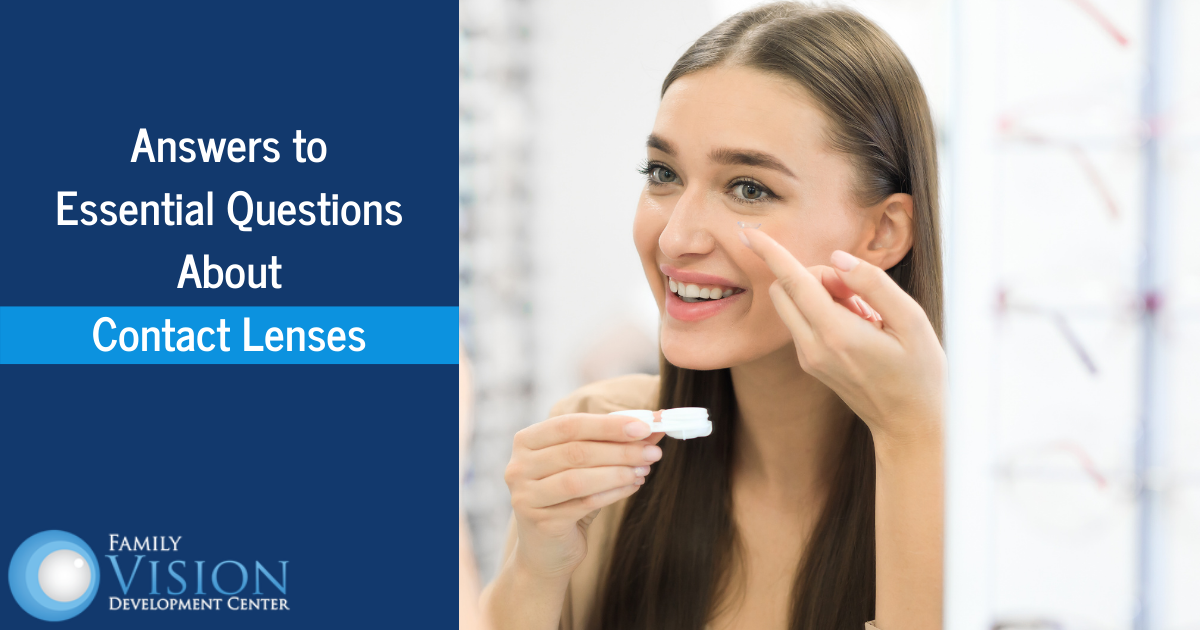Eyeglasses and contact lenses are the most common forms of vision correction and management for people of all ages. Choosing between the two is often a matter of personal preference, lifestyle and the specific vision condition that needs to be addressed. Contact lenses do require special consideration and people often need specific information before committing to this option. Here are answers to a few of the most common questions people have.
What kinds of eye problems can contact lenses manage?
Contacts are an effective vision management tool for a variety of refractive errors, which occur when the eye does not refract (bend or focus) light properly into the eye resulting in a blurred image:
- Myopia, also known as nearsightedness
- Hyperopia, also known as farsightedness
- Astigmatism, elongated corneal shape
- Presbyopia, near vision focus problems that start around age 40
Are soft or hard contact lenses the best?
This is a common question, but the answer is actually “it depends”. Either could be the right choice, based on your particular vision issues and needs.
- Soft contact lenses are typically more pliable and many people find them easier to work with. They also absorb water so your own tears can keep them moisturized. Additionally, soft contact lenses are available in disposable varieties that you throw away after each use, daily wear lenses that you wear daily for up to a month, or extended wear lenses that you can wear continuously for as much as a month.
- Hard contact lenses are made of hard plastic and may take a little extra time to get used to. However, they are very comfortable once you adapt to them. These would be a good choice for astigmatism, as they offer the most precise vision correction possible. Hard contact lenses are also a good option for people who have allergies or tend to get protein deposits on their contacts.
How do I properly care for my contact lenses?
Caring for your contact lenses properly is extremely important. The following tips will ensure the best experience possible:
- Use fresh, unexpired lens solution and carefully follow the specific instructions on the solution bottle
- Not all solutions are safe for all lenses so do not alternate or mix solutions
- Do not put lenses in your mouth or use saliva to lubricate your lenses
- Never rinse your lenses in tap water, as the lens could wash down the drain, or the impurities in the water may damage the lenses
- Contact lenses should be stored in an appropriate lens case, and the case should be cleaned regularly to avoid bacteria growth
At Family Vision Development Center, our experienced team will help to ensure that you understand the pros and cons of contact lenses so you can decide if they are the right choice for you. And our state-of-the-art optical center offers a wide selection of lens options to fit your lifestyle and personal preferences. Contact us at 630-862-2020 to schedule an appointment for your comprehensive vision exam, where we will complete a thorough evaluation and determine your best vision correction options.
Family Vision Development Center is a full-service vision center offering innovative vision therapy services, post-concussive vision rehabilitation, comprehensive vision exams for eyeglasses and contact lenses, management of ocular diseases including glaucoma, diabetes, macular degeneration and cataracts, and a state-of-the-art optical center offering the latest designs in eyewear. We are dedicated to keeping our patients comfortable and well-informed and we will explain every exam and procedure and answer all of your questions. We accept both scheduled and emergency appointments, and offer convenient financing and insurance options to ensure that high-quality vision care is available and affordable to all of our patients.

